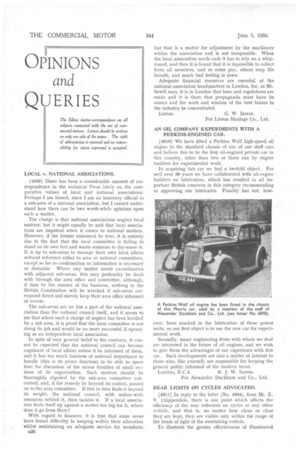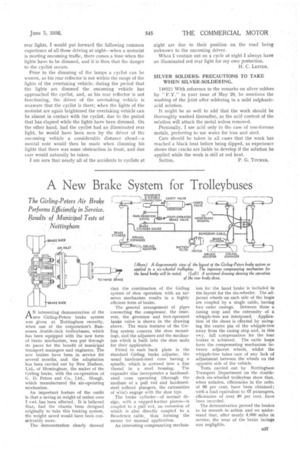()ANIONS
Page 36

Page 37

If you've noticed an error in this article please click here to report it so we can fix it.
and
QUERIES
The Editor invites correspondence on all subjects connected with the we of commercial Motors. Letters should be written on only one side of the paper. The right of abbreviation is reserved and no responsibility for views expressed is accepted.
LOCAL v. NATIONAL ASSOCIATIONS.
[4809] There has been a considerable amount of correspondence in the technical Press lately on the comparative values of local and national associations. Perhaps I am biased, since I am an honorary official in a sub-area of a national association; but I cannot understand how there can be two worth-while opinions upon such a matter.
The charge is that national associations neglect local matters; but it might equally be said that local associations are impotent when it comes to national matters. However, if the former statement be true, it is entirely due to the fact that the local committee is failing to stand on its own feet and wants someone to dry-nurse it. It is up to sub-areas to manage their own local affairs without reference either to area or national committees, except so far as confirmation or information is necessary or desirable. Where any matter needs co-ordination with adjacent sub-areas, this may preferably be dealt with through the area office and committee, although, if time be the essence of the business, nothing in the British Constitution will be wrecked if sub-areas correspond direct and merely keep their area Office informed of events.
The sub-areas are no less a part of the national association than the national council itself, and it seems to me that where such a charge of neglect has been levelled by a sub-area, it is proof that the local committee is not doing its job and would be no more successful if operating as an independent local association.
In spite of very general belief to the contrary, it cannot be expected that the national council can become cognizant of local affairs unless it be informed of them, and it has too much business of national importance to handle (this is its prime function) to be able to spare time for discussion of the minor troubles of small sections of its organization. Such matters should be• thoroughly digested by the sub-area committee concerned, and, if the remedy be beyond its control, passed on to the area committee. If this in turn finds it beyond its weight, the national council, with nation-wide resources behind it, then tackles it. If a local association finds itself up against a matter too big for it, where does it go from there?
With regard to finances; it is true that some areas have found difficulty in keeping within their allocation whilst maintaining an adequate service for members;
B20 but that is a matter for adjustment by the machinery within the association and is not insuperable. When the local association needs cash it has to rely on a whipround, and then it is found that it is impossible to collect from all members, and so some pay, others reap the benefit, and much bad feeling is sown.
Adequate financial resources are essential at the national association headquarters in London, for, as Mr. Sewill says, it is in London that laws and regulations are made and it is there that propaganda must have its source and the work and wisdom of the best brains in the industry be concentrated.
Linton. • • • G. W. IRWIN For Linton Haulage Co,, Ltd.
AN OIL COMPANY EXPERIMENTS WITH A PERKINS-ENGINED CAR.
[4810] We have fitted a Perkins Wolf high-speed oil engine to the standard chassis of one of our staff cars and believe this to be the first oil-engined private car in this country, other than two or three run by engine builders for experimental work.
In acquiring this car we had a twofold object. For well over 30 years we have collaborated with oil-engine builders on lubrication, which has resulted in all important British concerns in this category recommending or approving our lubricants. Finality has not, how-.
ever, been reached in the lubrication of these power units, so our first object is to use the new car for experi mental work. • • Secondly, many engineering firms with whom we deal are interested in the future of oil engines, and we wish to give them the advantages of our experience with this car. Such developments are also a matter of interest to those who, like yourself, are responsible for keeping the general public informed of the modern trend.
London, E.C.4. R. J. W. SANDS,
For Alexander Duckham and Co., Ltd.
REAR LIGHTS ON CYCLES ADVOCATED.
[4811] In reply to the letter (No. 4804), from Mr. E. V. Chippendale, there is one point which affects the efficiency of the rear reflectors on cycles or any other vehicle, and that is, no matter how clean or clear they are kept, they are visible only within the range of the beam of light of the overtaking vehicle.
To illustrate the greater effectiveness of illuminated. rear lights, I would put forward the fallowing common experience of all those driving at night—when a motorist is meeting oncoming traffic, there comes a time when the lights have to be dimmed, and it is then that the danger to the cyclist occurs.
Prior to the dimming of the lamps a cyclist can be unseen, as his rear reflector is not within the range of the lights of the overtaking vehicle; during the period that the lights are dimmed the oncoming vehicle has approached the cyclist, and, as his rear reflector is not functioning, the• driver of the overtaking vehicle is unaware that the cyclist is there; when the lights of the motorist are again brightened the overtaking vehicle can be almost in contact with the cyclist, due to the period that has elapsed while the lights have been dimmed. On the, other hand, had the cyclist had an illuminated rear light, he would have been seen by the driver of the oncoming vehicle a considerable distance ahead—a mental note would then be made when dimming his lights that there was some obstruction in front, and due care would naturally be taken.
I am sure that nearly all of the accidents to cyclists at night are due to their position on the road being unknown to the oncoming driver.
When I venture out on a cycle at night I always have an illuminated red rear light for my own protection.
H. C. LESTER.
SILVER SOLDERS: PRECAUTIONS TO TAKE WHEN SILVER-SOLDERING.
f48121 With reference to the remarks on silver solders by ' F.Y." in your issue of May 29, he mentions the washing of the joint after soldering in a mild sulphuricacid solution.
It might be as well to add that the work should be thoroughly washed thereafter, as the acid content of the solution will attack the metal unless removed.
Personally, I use acid only in the case of non-ferrous metals, preferring to use water for iron and steel.
Care should be taken in all cases that the work has reached a black heat before being dipped, as experience shows that cracks are liable to develop if the solution be applied while the work is still at red heat.
Sutton. P. G. TUCKER.




















































































